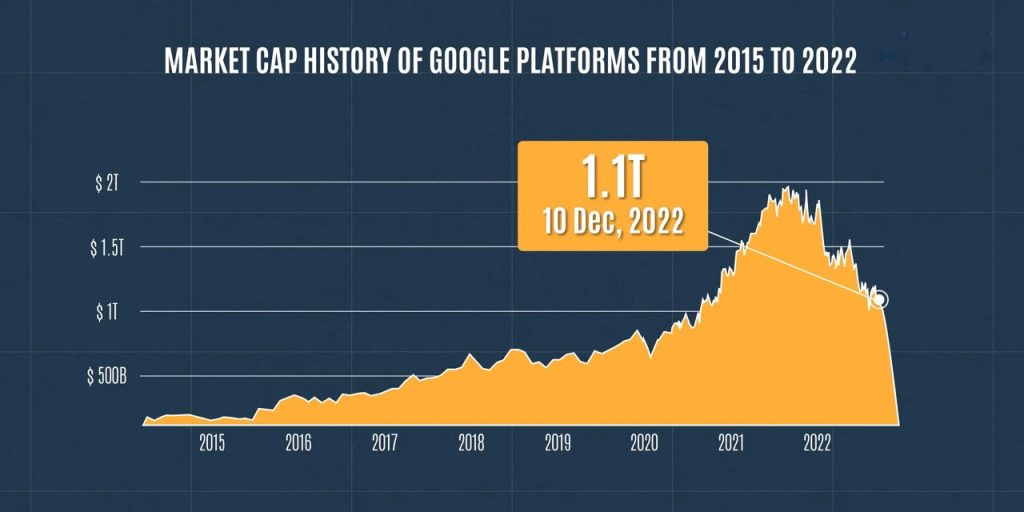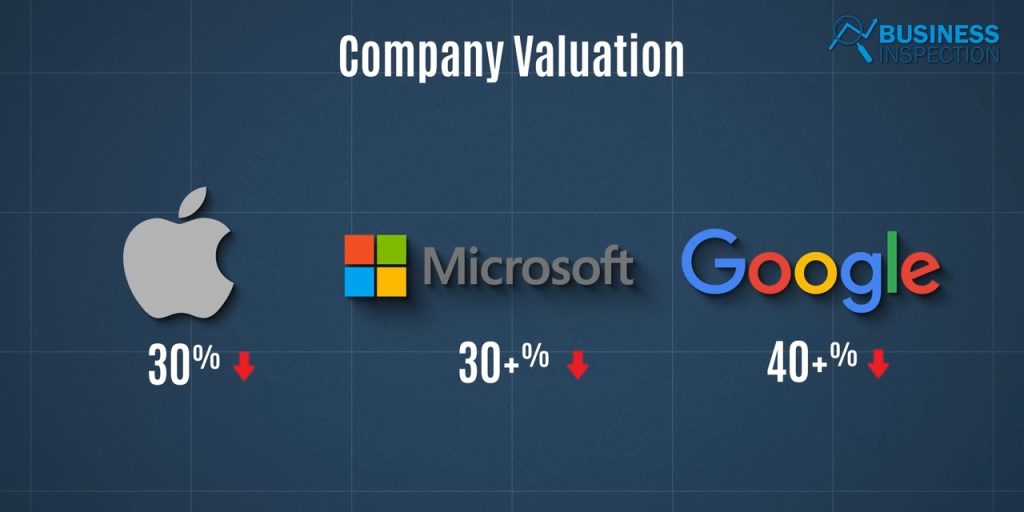Since the beginning of 2022, there has been a decline in the revenue of technology companies worldwide. Nearly all tech companies have experienced a decrease in valuation of 50% or more, including well-known names such as Amazon, Meta, Snap, Stripe, Coinbase, Twitter, and Netflix. In fact, the total valuation loss for the tech industry in 2022 has been estimated to be over $7 trillion. Additionally, many tech companies have been implementing layoffs in large numbers since the second quarter of the year. As of December 10, 2022, a total of 946 tech companies worldwide have laid off a staggering 1,49,876 workers. According to Business Insider, this number may continue to rise in the near future. The exact reason for the decline in the once-thriving tech industry, which was booming during the COVID-19 pandemic, remains unclear.
Overview
In June 2021, Meta, the parent company of Facebook, achieved a historic milestone by surpassing a $1 trillion valuation for the first time. However, after a few months, the stock price of Meta began to experience a continuous decline. On October 4, 2022, Facebook experienced a technical outage which caused the stock price to fall an additional 5 percent and Mark Zuckerberg’s personal wealth decreased by $6 billion. In the past year, Meta has lost two-thirds of its $1 trillion peak valuation, leaving it with a current market valuation of over $300 billion. Furthermore, the company’s revenue decreased 1 percent in the second quarter and 4 percent in the third quarter of 2022 compared to the same period of the previous year. As a result, in November 2022, the company announced the layoffs of 13 percent of its total workforce, which equates to over 11,000 employees.
The tech industry has been facing extreme challenges, leading to significant losses in market value, decreased revenue, and layoffs. One example is the global tech giant Amazon, whose market valuation has declined by more than half in the past year, from approximately $1.9 trillion in July 2021 to less than $870 billion. Additionally, the company suffered a net loss of approximately $3 billion in the first three quarters of 2022, compared to a net profit of $19 billion during the same period in the previous year. In November 2022, Amazon announced the layoff of 10,000 employees from underperforming segments, such as the voice assistant Alexa and ebook readers Kindle.
Google, another leading tech company, ended 2021 with a market capitalization of $1.91 trillion, but has experienced a 40 percent decrease in the past year, bringing its market valuation to $1.1 trillion.

The company’s net income also declined in all three quarters of 2022, compared to the same period in the previous year, with a net income of $46.34 billion from January to September 2022, a decrease of 16 percent compared to the previous year’s $55.39 billion. According to a CNBC report, despite not conducting any layoffs, the company has been focusing on increasing efficiency by cutting costs on various projects by up to 20 percent. This has resulted in the merger of the paid maps service Waze with Google Maps, and the closure of the cloud gaming service Google Stadia on September 29, 2022.
Netflix, a dominant player in the online streaming industry, had a market capitalization of over $300 billion by October 2021, but experienced a loss of millions of users globally in the first two quarters of 2022 and a 35 percent decrease in stock price according to Forbes. Despite gaining over 1.2 billion subscribers in the first three quarters of 2022, this was 87.47 percent less than the same period in the previous year. By December 2022, the company had lost over 57 percent of its valuation, reaching $130 billion. In June 2022, Netflix also laid off over 300 employees.
Other tech giants, such as Apple and Microsoft, have also experienced losses in market valuation. Apple has ceased new hiring but has not conducted any layoffs, while Microsoft laid off 1,000 employees from its EDGE and Xbox divisions in October 2022. Other companies, including Twitter (7,500), Snap (20 percent), DoorDash (6 percent), and Lyft (13 percent) have also conducted layoffs. The tech world is currently facing challenging times.

Why Struggling?
Economic Recession
The worldwide pandemic resulted in widespread disruptions to global supply chains. As the global economy began to recover from the pandemic, the conflict between Ukraine and Russia caused further instability and uncertainty. Western countries imposed various sanctions on Russia, leading to a rise in fuel oil prices and production difficulties in numerous countries. This, combined with a global food shortage, caused a continued rise in the global inflation rate. In response, the United States government took measures to control inflation by tightening the money supply in the market through an increase in interest rates. This caused a decrease in the value of world currencies relative to the dollar and a decline in purchasing power, leading to a global recession. As a result, individuals began to focus on purchasing essential goods and reducing non-essential expenditures, including canceling services from technology companies and reducing online purchases. This reduction in online shopping, particularly in the United States, caused a decline in revenue for several quarters across various industries, including the tech industry. In an effort to reduce expenses, tech companies began to implement layoffs as a cost-saving measure in response to pressure from investors.
Privacy Concern Of User Data
Advertising revenue constitutes a substantial 97 percent of Facebook and Matter’s overall earnings. Similarly, over 81 percent of Google’s total earnings stem from advertising services. However, in the second and third quarters of 2022, there was a decline in Matter’s advertising service-based revenue. Additionally, YouTube’s ad revenue saw a 1.9 percent decrease on a year-over-year basis in 3Q2022, and Alphabet, Google’s parent company, generated a revenue of $1 billion less than what analysts had projected. Several analysts attribute this struggle to Apple’s privacy-focused updates, particularly the implementation of the App Tracking Transparency (ATT) feature in April 2021. The implementation of this feature has resulted in a decrease in the accuracy of advertisements provided by companies such as Facebook and Google, which has had a negative impact on their ad revenue.
Overstaffed
Following the outbreak of the Corona pandemic, various governments across the globe have implemented financial measures aimed at maintaining economic stability. In March of 2020, the United States government took action by boosting its federal reserves by 12.4 percent to reach $5.3 trillion within one week, providing $1.7 trillion in financial support to businesses during the pandemic. Additionally, the US Federal Reserve Bank reduced the interest rate from 1-1.25 percent to 0-0.25 percent.

According to Forbes, technology companies have been hiring substantial numbers of employees with the aid of government assistance and low-interest loans from banks to meet the increased demand for services during the lockdown, and to implement new features. However, as users resumed their normal lifestyles after the lockdown, both user and revenue growth of these companies saw a decline due to the Mean Reversion effect. As a result, these companies now face the challenge of sustaining growth and retaining newly hired employees.
Over Valuation
During the coronavirus epidemic of 2020 and 2021, not only did the tech giants of the world experience a surge in growth, but various tech-based e-commerce and delivery services as well as social media platforms and revenues also saw an unexpected increase. This was accompanied by a rise in the valuation of these companies.
| Revenue of FAANG Companies | |||
| Company Name | 2019 | 2020 | 2021 |
| META | 70,697 | 85,966 | 117,929 |
| Apple | 260,174 | 274,515 | 365,817 |
| Amazon | 280,522 | 386,064 | 469,822 |
| Netflix | 20,156 | 24,996 | 29,697 |
| 161,857 | 182,527 | 257,637 | |
| Numbers In Million | |||
As a result of the worldwide lockdowns, people became increasingly dependent on online platforms. They spent more time on social media sites such as Facebook, Twitter, and WhatsApp for communication and work purposes. Unable to dine out, they resorted to ordering food delivery services like Uber Eats, DoorDash, and GrabHub, and entertained themselves with streaming services like Netflix, Amazon Prime, and Disney Plus. To support the standard of living of their citizens during the lockdown, governments of different countries provided financial incentives. For instance, the US government allocated $1.8 trillion in incentives to its citizens, boosting their purchasing power and contributing to the unexpected revenue growth of tech companies.
Investors also began to invest in the stocks of these companies, which led to a significant increase in their valuations. For example, Apple’s valuation rose from $1.2 trillion to nearly $3 trillion, and Microsoft’s valuation more than doubled from $1.2 trillion to $2.5 trillion. Alphabet, Facebook, Amazon, Netflix, and Tesla also experienced a significant increase in their valuations.

However, as countries began to lift lockdowns in mid-2021, people returned to their pre-pandemic lifestyle, leading to a slowdown in the exponential growth of these companies. This phenomenon is referred to as Mean Reversion, where it is predicted that an asset’s price will eventually return to its average even if it increases temporarily. Despite the companies’ expectations that people’s reliance on their services would persist, the end of the lockdown caused people’s habits to revert back to pre-Corona levels. Additionally, the cost of living increased due to various economic policies and geopolitical tensions, causing people to focus more on essential products. As a result, the revenues of these companies decreased, and their valuations also started to drop. Apple, Microsoft, Google, Amazon, Netflix, Facebook, Tesla, and others have all suffered a significant loss of valuation, with some losing up to two-thirds of their pandemic peak valuations.












Leave a Comment